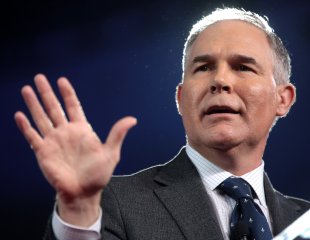
This article was made possible by the readers and supporters of AlterNet.
Pruitt’s disastrous policies threaten the safety of the nation’s air and water, jeopardizing public health.
The latticework of alleged ethics violations swirling around U.S. Environmental Protection Agency (EPA) Administrator Scott Pruitt certainly calls into question his fitness to serve our country. Far more dangerous, though, is his utter fealty to polluters, which drive policies that present devastating threats to the air we breathe and the water we drink. The consequences of his disastrous decisions jeopardize the health and welfare of current and future generations.
The three examples below represent just a few of Pruitt’s gifts to industrial polluters for which he should be removed from office immediately.
1. Eliminating Regulations on Coal Ash
Water pollution from coal-fired power plants—and particularly their coal ash dumps—is the single largest source of toxic water pollution in the United States; coal plants dump more toxics into our waters than the other top nine polluting industries combined.
There are more than 1,400 coal ash dumps, containing millions of tons of toxic waste, at power plants throughout the United States. Roughly half of them have no liners and 70 percent are situated in low-income communities. Waterkeeper Alliance has investigated dozens of coal ash dumps all over the country and found toxic pollutants like chromium, cadmium, arsenic, mercury and lead discharging out of more than 90 percent of them into waterways used by citizens for drinking, swimming and fishing.
These toxins increase risks of multiple types of cancer, heart disease and organ failure.
In 2015, the EPA—for the first time—set standards for how power plants store and dispose of their coal ash. Despite the clear threat that coal ash presents to public health, Pruitt’s EPA now wants to eliminate even these bare minimum standards. Pruitt claims that regulations are killing the coal industry. To the contrary, renewables and market forces are putting coal out of business—despite his attempts to keep the industry on life support.
Under the guise of providing flexibility to states, Pruitt wants to roll back rules that help protect our drinking water from coal ash. His proposed rollbacks project to save the coal industry between $31 million and $100 million in compliance costs. But what about the financial and emotional costs imposed on communities suffering from leaking coal ash dumps in their communities? For every day that Pruitt props up the coal industry, Americans suffer loss to their health and property.
2. Narrowing the Definition of “Waters of the United States”
Upon taking office, one of Pruitt’s first actions was to take aim at the definition of “Waters of the United States,” which identifies the waterways that are protected from pollution under the Clean Water Act (CWA). Pruitt is looking to significantly narrow the definition presumably in order to enrich his polluter pals.
The CWA’s definition of “waters of the United States” is essential for protecting human health; the well-being of communities; the success of local, state and national economies; and the functioning of our nation’s vast, interconnected aquatic ecosystems; as well as the many threatened and endangered species that depend on those resources.
Opening up a creek or wetland to indiscriminate pollution can negatively affect a community’s drinking water supply and property values. Pruitt’s disdain for the CWA and the waters it protects reflects both a complete ignorance of how an ecosystem works and his role as a puppet to industry.
3. Adding a Groundwater Loophole
The EPA currently is considering adding a gaping loophole to the CWA; the agency is accepting comments on whether the CWA should apply to pollutants discharged to groundwater which then directly travel a short distance to pollute surface waters.
Picture a scenario where an industrial polluter releases pollutants from a pipe just short of a surface waterway. The pollutants do not discharge directly into the waterway, but rather seep into the ground, travel a short distance via groundwater, and then contaminate surface waters.
Under changes being considered by the EPA, and contrary to long-standing agency and judicial interpretations, the CWA would not apply to these discharges, allowing the polluter to legally dump unlimited amounts of pollutants and stifling citizens’ ability to protect their communities’ waterways. This potential gift to polluters was not remotely contemplated by Congress when it passed the CWA.
These three examples—among many others proposed by the Trump/Pruitt EPA—demonstrate Pruitt’s pattern of protecting polluters instead of people. Regardless of politics and all of his alleged ethical lapses, the EPA Administrator’s biggest scandal is making decisions that favor the wallets of industry barons at the expense of Americans’ health and welfare.
Fortunately, his ineptitude has led to hasty and sloppy rulemakings and rollbacks that we plan to defeat in court. Nevertheless, the Administration needs to remove Pruitt from office now.
This article was produced by Earth | Food | Life, a project of the Independent Media Institute.
Feature image by Gage Skidmore/Flickr.